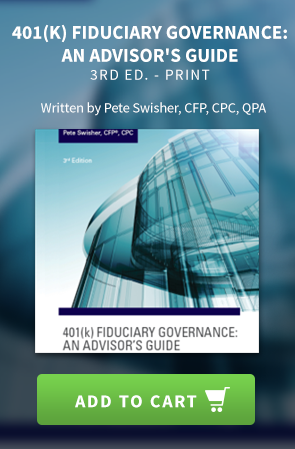Fiduciary Rules and Practices
Tech Talk discusses engagement letters that auditors prepare before they conduct their review of a plan.
READ MORE
An ERISA preemption challenge to the CalSavers Retirement Savings Program is gearing up for another go at it.
The Howard Jarvis Taxpayers Association has filed a notice in Howard Jarvis Taxpayers Ass’n. v. Calif. Secure Choice Ret. Sav. Program, E.D. Cal., No. 2:18-cv-01584, notice of appeal 4...
READ MORE
President Trump on March 27 signed into law the sweeping $2.2 trillion stimulus bill that includes retirement relief provisions supported by the American Retirement Association.
It wasn’t easy—or at least not as easy as it might have been—but the signing of the Coronavirus, Aid, Relief and...
READ MORE
A federal appellate court has ruled in favor of the fiduciaries of a university 403(b) plan excessive fee lawsuit.
This was the second of the 403(b) university excessive fee suits to go to trial—and the second in which the university defendants prevailed, back in May 2018.
The original suit,...
READ MORE
Under the Department of Labor’s 2012 final rule to improve transparency of fees and expenses to workers in 401(k)-type retirement plans, there are three categories of plan-related information that must be disclosed. These forms of information must be given to participants on or before the date they...
READ MORE
As the Senate squabbles over legislation designed to alleviate the impact of the coronavirus, the Speaker of the House has unveiled a version with slightly different provisions regarding retirement plans.
House Speaker Nancy Pelosi (D-CA), contending that the Senate Republicans’ bill “put...
READ MORE
In MarketBeat, John Iekel discusses a recent blog post that suggests that investment committees can be helpful in knowing, and fulfilling, fiduciary duties and offers tips on building or strengthening one.
READ MORE
There may be a whole new focus emerging with regard to excessive fee litigation.
Last week a reader shared with us an “Excessive Fee Questionnaire Regarding Defined Contribution Plans.” This document was reportedly presented to a plan sponsor of a $170 million plan—from its property and...
READ MORE
Plans covered by ERISA are required to make certain disclosures. The Department of Labor provides a basic discussion of some of the most important disclosures that must be made.
One of the most important documents participants are entitled to receive automatically when becoming a participant of an...
READ MORE
The Massachusetts Secretary of the Commonwealth has finalized a new fiduciary conduct standard, one that, consistent with the recommendation of the American Retirement Association, acknowledges ERISA’s preemption.
Contending that the SEC’s Regulation Best Interest falls short, Secretary William...
READ MORE
The Securities and Exchange Commission (SEC) is putting sales of 403(b) plans to teachers under its scrutiny. Where did this come from? And what does it mean?
In June 2019, the SEC announced two new initiatives that it said built on its ongoing efforts to protect retail investors: The Teachers...
READ MORE
Non-ERISA 403(b) plans are exempt from the ERISA Section 408(b)(2) requirements. It’s important to distinguish the difference between an ERISA and non-ERISA plan.
A basic definition of ERISA vs. non-ERISA includes the employer’s involvement.
In an ERISA plan, an employer chooses the...
READ MORE
In MarketBeat, Ted Godbout discusses a webcast that examines whether the SECURE Act’s provisions that seek to foster greater adoption of guaranteed lifetime income products by DC plans and participants will be enough.
READ MORE
A federal judge has ruled on the attorneys’ fees requested by Schlichter Bogard & Denton in a 403(b) university excessive fee suit.
In what he described as a “highly complex case with numerous issues that were vigorously contested,” Judge George Levi Russell III of the U.S. District Court for...
READ MORE
Those who had hoped for some clarity – or perhaps a shift – in the standards involving where, and how, to draw the line between the obligations of corporate officials and ERISA plan fiduciaries – will have to wait a little longer, writes Nevin Adams in MarketBeat.
READ MORE
ERISA imposes a number of responsibilities on the plan administrator relating to the handling of domestic relations orders.
As a plan fiduciary, the administrator is required to discharge these responsibilities prudently and solely in the interest of the plan’s participants and beneficiaries....
READ MORE
The biggest 403(b) university settlement to date has been approved – but with a cut to the proposed fees for the plaintiffs’ attorneys.
The suit – brought by five employees of Massachusetts Institute of Technology (MIT) and participants in the MIT Supplemental 401(k) Plan – was filed back in...
READ MORE
Fiduciaries have important responsibilities and are subject to standards of conduct because they act on behalf of participants in a retirement plan and their beneficiaries. These responsibilities include:
acting solely in the interest of plan participants and their beneficiaries and with the...
READ MORE
The most significant piece of retirement legislation in a decade could become a reality, after all.
Hill staff worked throughout the weekend to put the finishing touches on the nearly $1.4 trillion spending bill for FY 2020, which will likely be the last “legislative vehicle” for 2019 – and things...
READ MORE
Many of the actions involved in operating a plan make the person or entity performing them a fiduciary. Using discretion in administering and managing a plan or controlling the plan’s assets makes that person a fiduciary to the extent of that discretion or control. Providing investment advice for a...
READ MORE


